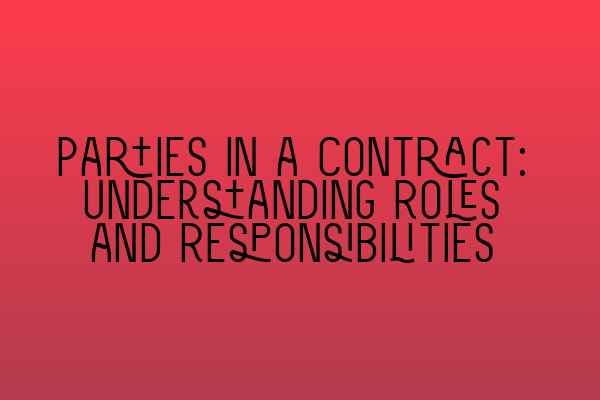Parties in a Contract: Understanding Roles and Responsibilities
Contracts are the foundation of legal transactions, serving as binding agreements between parties involved. Successful contract negotiation and execution rely on a thorough understanding of the roles and responsibilities of the parties involved. In this article, we will explore the key aspects of parties in a contract, their obligations, and how these roles intersect in the legal landscape.
The Essential Parties in a Contract
A contract typically involves two main parties: the Offeror and the Offeree. The Offeror is the party initiating the contract by making an offer, while the Offeree is the party to whom the offer is presented, with the option to accept or reject the offer. The Offeror seeks to create a legal obligation, and the Offeree has the power of acceptance or refusal. These roles are crucial in establishing the foundation of contractual relations.
Once the offer is accepted, the Offeror and the Offeree become Contracting Parties, binding themselves to the terms and conditions outlined in the contract. It is important to note that contracts can have multiple parties involved, each with their own specific roles and responsibilities.
Understanding Roles and Responsibilities
Within a contract, each party has unique roles and responsibilities that contribute to the overall agreement. Let’s delve into the main parties and their obligations:
1. Promisor and Promisee
The Promisor is the party who makes a promise or offers something of value in the contract. They are legally bound to fulfill the obligations outlined in the agreement. Conversely, the Promisee is the party to whom the promise is made. They have the right to expect the promised fulfillment and can seek legal remedies if the Promisor fails to fulfill their obligations.
2. Vendor and Purchaser
In a contractual relationship involving the sale of goods or services, the Vendor is the party who sells or supplies the goods, while the Purchaser is the party who acquires or purchases the goods. The Vendor is responsible for providing the goods or services as agreed upon, while the Purchaser is obligated to make the required payment within the agreed terms. Both parties have responsibilities that ensure a fair and satisfactory transaction.
3. Lessor and Lessee
In leasing or rental agreements, the Lessor is the party who owns the property and grants the right to use or occupy it, while the Lessee is the party who pays for the right to use or occupy the property. The Lessor has the responsibility to maintain the property in a habitable condition, while the Lessee is expected to pay rent and adhere to any specified conditions outlined in the lease agreement. Understanding these roles is crucial to maintaining a harmonious landlord-tenant relationship.
The Intersection of Roles
While each party in a contract has distinct roles and responsibilities, their actions and obligations often intersect. Effective contract management requires a clear understanding of these intersections to ensure a smooth execution of the agreement.
1. Performance and Consideration
The performance of the contract refers to the parties fulfilling their respective obligations as agreed upon. In return for performance, the parties generally receive consideration – something of value given, promised, or performed as part of the contract. This mutual exchange is the essence of a contract. Understanding the performance and consideration elements is essential for determining whether a contract has been properly executed.
2. Breach of Contract
If one party fails to fulfill their obligations under the contract, it constitutes a breach of contract. This breach may result in legal consequences and the injured party seeking remedies such as damages or specific performance. Understanding the rights and remedies available in the event of a breach is crucial for protecting the interests of the affected party.
3. Assignment and Delegation
Contracts may allow for the assignment or delegation of rights and obligations to third parties, provided it is not expressly prohibited. Assignments transfer the rights and obligations of a party to another party, while delegation involves the transfer of duties to another individual or entity. Understanding the rules and limitations surrounding assignment and delegation is vital to preserve the integrity and enforceability of the contract.
Conclusion
Contracts are the cornerstone of legal agreements, and understanding the roles and responsibilities of the parties involved is crucial for their successful execution. By comprehending the various party roles, such as the Promisor and Promisee, Vendor and Purchaser, and Lessor and Lessee, one gains a deeper understanding of contract dynamics. Additionally, recognizing the intersections of roles, such as performance and consideration, breach of contract, and assignment and delegation, allows for effective contract management and resolution of disputes.
For more insights into the legal profession and related topics, check out these related articles:
- Barrister vs. Solicitor: A Comprehensive Comparison
- Embracing the Rise of Virtual Law Practices
- Unveiling Real-Life Case Studies: Insights into Legal Practice and Decision-Making
- Exploring Solicitor Salaries in the UK: Average Earnings and Factors Affecting Income
- Mastering Client Relationship Management: Skills for Solicitors to Enhance Trust and Loyalty
